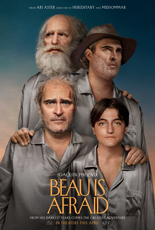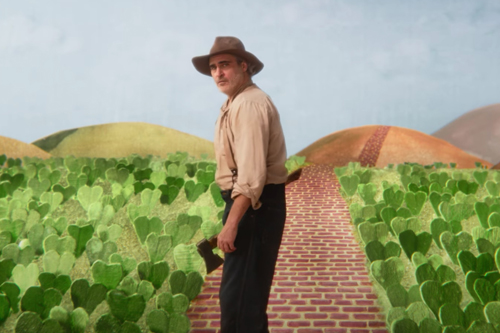
 Beau Is Afraid isn’t somber, subtle or suspenseful. Nor should it be. Described by director Ari Aster (Hereditary) as a “nightmare comedy,” Beau is a bizarre odyssey through a twisted, unempathetic world. It’s also Aster’s most intimate and possibly important film to date.
Beau Is Afraid isn’t somber, subtle or suspenseful. Nor should it be. Described by director Ari Aster (Hereditary) as a “nightmare comedy,” Beau is a bizarre odyssey through a twisted, unempathetic world. It’s also Aster’s most intimate and possibly important film to date.
Joaquin Phoenix (Joker) stars as Beau, a neurotic man living in an apartment on the corner of John Waters’ Desperate Living and John Carpenter’s Escape from New York. While leaving his apartment to visit his mom, Beau immediately loses his keys, luggage and sanity.
Describing much more of the film’s premise will almost certainly diffuse the magic. Instead, enjoy this sequence of events from 10 minutes of the film’s first act:
• A naked Beau rolls around with a sweaty man hiding above his bathtub.
• Beau is then hit by a truck and stabbed multiple times by an equally naked homeless man.
• A recovering Beau heals in the bright pink bedroom of a homophobic slur spewing teenaged girl who gives Sadie Sink’s character in The Whale a run for her money.

Beau’s life isn’t a comedy of errors; it’s a hilarious tragedy of worst-case scenarios. The punchline is often cruelty, and Aster’s sick sense of humor often lands with a few especially fucked-up exceptions.
Phoenix carries this three-hour I Think You Should Leave sketch masterfully. He dusts off a bit of the old Freddie Quell for a paradoxically rigid and explosive performance. Doubt, caution and, of course, fear complement the tortured traveler. Beau’s reluctant journey proves there’s no place like home — even when it’s hell.
Beyond the plot’s absurdity, Fiona Crombie’s (The Favourite) production design oozes with detail. Consider Beau’s setting an upgrade from the vivid (albeit rarely seen) interiors of Aster’s Midsommar (minus the runes in favor of misspelled expletives and graffitied dicks, naturally). The film flows into cookie-cutter suburbia, a beautifully animated dream within a dream and, finally, Beau’s mother’s house. Each transition is jarring in all the right places.
Despite being played for excruciatingly painful laughs, Beau also doesn’t shed the pit-in-your-stomach feeling that gave Hereditary its staying power. Even while the film’s universe is built on a general apathy around death, it carries an impact that builds to a dreadful crescendo. Granted, by the end, what few demises remain feel a bit weightless. But that probably comes less so from Aster’s writing of any one scene, and more from the exhaustion of a saga that’s about 15 to 20 minutes too long.
It’ll be years — possibly decades — before folks stop chewing on Beau Is Afraid. It’s everything you could expect from Aster, yet still filled with welcome (and sadistic) surprises. Beau is ultimately a lot of things. “Afraid” barely scratches the surface. —Daniel Bokemper
